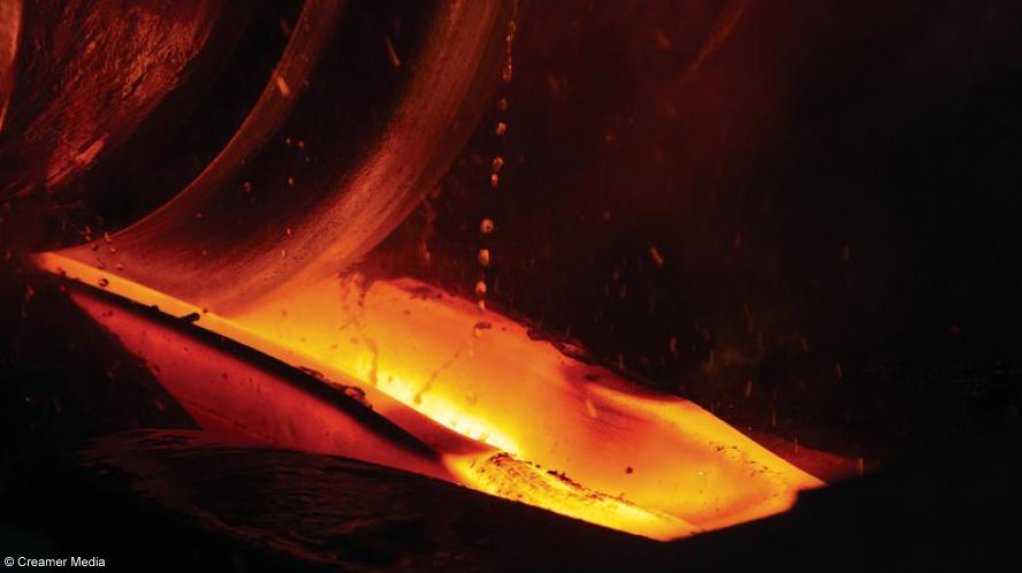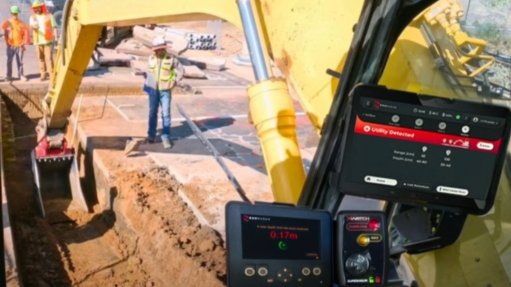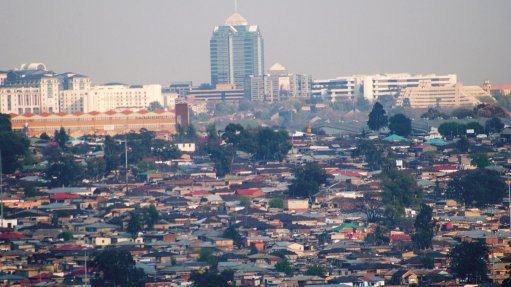ArcelorMittal South Africa responds to Itac’s termination of safeguard probe
Earlier this month, the International Trade Administration Commission of South Africa (Itac) recommended that an investigation be terminated into the imposition of safeguard duties on certain steel sections manufactured at the Highveld Structural Mill. The application was lodged in June 2020 by Evraz Highveld Steel and Vanadium Corporation Limited, Highveld Structural Mill and ArcelorMittal South Africa. Engineering News approached ArcelorMittal South Africa for comment on the decision and the steel producer provided the following response:
Engineering News: What is ArcelorMittal’s response to Itac’s decision to terminate a safeguard investigation into certain long-product sections?
The reality is that imported steel products continue to impact the viability of the South African steel industry. The various protection measures implemented by the South African government are in place to protect the entire South African steel manufacturing sector and not just one player. These measures are vital for the survival of the country’s steel industry and for ensuring the steel sector remains the backbone of South Africa’s industrial manufacturing capacity and capability.
The most substantial steel-producing countries have taken significant steps to protect their steel sectors against imports as per internationally agreed WTO rules. For context on customs duties:
- All major steel-producing countries are actively protecting their domestic steel industries with trade measures and tariff regimes being retained, extended and new tariff and non-tariff systems being introduced.
- Normal customs duties on steel imports are to be seen in most countries in the world, i.e. 150+ out of 200 countries; and in almost all major steel producing countries.
- 135 countries have an average of 10% duty on South African exports to them (8.5% duty on flat products and 11% on long products), including China which has a duty of 5% on South African imports.
All the main regions, including Europe (the countries that make up the European Union, as well as Russia and Turkey), the Americas (US, Canada, Brazil, Mexico) and Asia (Japan, Korea, Taiwan, Vietnam and even China), afford some or all forms of protection to their local manufacturers, namely: anti-dumping duties (38 countries including EU as 1); countervailing measures (11); safeguard duties (5); and safeguarding quotas (20).
Fifteen countries have two or more protection measures, 18 have at least one, in addition to normal custom duties which are applied in most countries in the world. For South Africa not to protect its steel production, steel-related manufacturing and industrial capability, as it emerges from the significant economic impact of a lockdown, will be disastrous for the industry and the economy.
Is it correct that ArcelorMittal South Africa was seeking a 120% safeguard duty?
In collaboration with Evraz Highveld Steel, ArcelorMittal South Africa applied for safeguards on structural steel products produced in the Highveld Structural Mill, being the only producer of these products. (For a sense of proportion, structural steel products represent only 5% of the long steel products market in South Africa.)
In our understanding, the applicant in a safeguard application is not required to apply for a specific duty. Instead, a safeguard application simply presents the facts and, based on those facts and after a comprehensive investigation, Itac decides whether to grant a safeguard and, if so, at what level it should be placed.
The joint application by ArcelorMittal South Africa and Evraz Highveld Steel did not ask for a 120% safeguard duty. However, the applicants did submit prima facie evidence on the substantive issues that would trigger an investigation by Itac. Based on certain assumptions and calculations, a duty of around 120% was presented in the submission as an indication of the relief that would be acceptable to mitigate serious injury to the local industry.
Which countries were cited in the application?
Technically, the joint application was for a safeguard and not an anti-dumping investigation, therefore no country would have been investigated for “dumping”.
Generally, safeguard investigations are initiated in terms of Regulation 4.1 of the Safeguard Regulations, where the substantive requirement for the initiation is prima facie evidence relating to: unforeseen developments, a surge in volumes; the imports causing, or threatening to cause, serious injury to the industry concerned; and a causal link to the surge in imports.
When considering the period 2015 to 2020, the majority of imports originated from Europe, followed by China, then Korea and Thailand. Imports from these countries represented 91% of total imports.
What protection do these sections receive currently and which industries use these sections?
Imports of heavy section products are currently subject to a general import duty of 10%, excluding imports from the European Union which are exempt due to the FTA between the two parties. These heavy steel sections are used by the construction, mining and rail sectors.
Will Highveld continue to manufacture these sections in light of the Itac decision?
Yes.
Which ArcelorMittal South Africa products continue to receive safeguard protection and at what rate?
There are currently no safeguard duties in place on products produced by ArcelorMittal South Africa.
The animosity between ArcelorMittal South Africa and downstream industry seems to be growing. What actions is ArcelorMittal South Africa taking to try to ease these tensions?
ArcelorMittal South Africa enjoys good relations with most of its customers and there is regular engagement at various levels within the business to discuss specific customer needs and industry challenges. However, it seems that there are those in the industry who seem set on advancing their own agenda for short-term gains rather than ensuring the long-term growth and sustainability of the industry.
ArcelorMittal South Africa has assisted the downstream industry to compete against imported finished steel imports and has supported various efforts to obtain protection for the downstream industry (such as on the wire drawing and fastener sectors). Further, given the structural impediment of the credit insurance available to the steel industry, and the serious constraint it currently presents to businesses, the company is working closely with its customers to manage the limited available credit in how back-orders are being fulfilled, given that many customers do not have the credit cover lines to fund such back-orders. This position is being aggravated by the arrival of long-lead-time imported material, for those who chose this option and now are experiencing a funding squeeze.
What is the domestic demand outlook currently, and how could it be impacted by a possible National Union of Metalworkers of South Africa strike?
Stronger gross domestic product growth forecasts for South Africa for the second half of 2021 are positive for steel demand. Unless there is damage to overall business sentiment in South Africa as a result of further economic lockdowns for Covid-19, a healthier market and operating environment are expected to have a positive impact on the market in the second half of the year. It is difficult to speculate on the impact of a strike on South African steel demand and supply as there are many factors which would influence this, including the extent and reach of the strike and how long it lasts.
Anything further?
It is vital that we avoid the country becoming a steel importer, leaving the upstream and downstream industries at the mercy of the global steel market. South Africa's distance from the nearest steelmaking nations increases the risk to supply and poses challenges for importing due to long lead times and high transport costs. Steelmaking remains a key strategic industry for South Africa. Each tonne of steel produced domestically adds to the national economy, creates jobs and provides value through beneficiation of natural resources. It is estimated that it would take more than a decade to re-establish an integrated steel industry in South Africa were it to disappear. This is clearly something that can only be detrimental to the South Africa economy in every sense.
Article Enquiry
Email Article
Save Article
Feedback
To advertise email advertising@creamermedia.co.za or click here
Press Office
Announcements
What's On
Subscribe to improve your user experience...
Option 1 (equivalent of R125 a month):
Receive a weekly copy of Creamer Media's Engineering News & Mining Weekly magazine
(print copy for those in South Africa and e-magazine for those outside of South Africa)
Receive daily email newsletters
Access to full search results
Access archive of magazine back copies
Access to Projects in Progress
Access to ONE Research Report of your choice in PDF format
Option 2 (equivalent of R375 a month):
All benefits from Option 1
PLUS
Access to Creamer Media's Research Channel Africa for ALL Research Reports, in PDF format, on various industrial and mining sectors
including Electricity; Water; Energy Transition; Hydrogen; Roads, Rail and Ports; Coal; Gold; Platinum; Battery Metals; etc.
Already a subscriber?
Forgotten your password?
Receive weekly copy of Creamer Media's Engineering News & Mining Weekly magazine (print copy for those in South Africa and e-magazine for those outside of South Africa)
➕
Recieve daily email newsletters
➕
Access to full search results
➕
Access archive of magazine back copies
➕
Access to Projects in Progress
➕
Access to ONE Research Report of your choice in PDF format
RESEARCH CHANNEL AFRICA
R4500 (equivalent of R375 a month)
SUBSCRIBEAll benefits from Option 1
➕
Access to Creamer Media's Research Channel Africa for ALL Research Reports on various industrial and mining sectors, in PDF format, including on:
Electricity
➕
Water
➕
Energy Transition
➕
Hydrogen
➕
Roads, Rail and Ports
➕
Coal
➕
Gold
➕
Platinum
➕
Battery Metals
➕
etc.
Receive all benefits from Option 1 or Option 2 delivered to numerous people at your company
➕
Multiple User names and Passwords for simultaneous log-ins
➕
Intranet integration access to all in your organisation




















